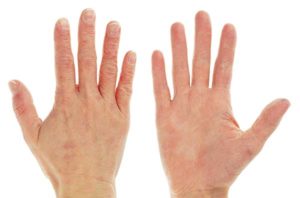Eczema (atopic dermatitis)
 Eczema, also called atopic dermatitis, is a common chronic, relapsing, inflammatory Skin condition in children as well as adults. It is especially common in infants and young children and in fact is the most common chronic skin condition in children with a lifetime prevalence of 17%. It starts before the age of 5 years approximately 90% of the time. Eczema is associated with a dysfunction of the skin barrier, causing excessive water loss from the skin. There is also a defect in the production of substances in the skin that fight infections, which results in frequent infections with Staph bacteria as well as occasional infections with other organisms such as the herpes virus. A good source for further information is the National Eczema Association.
Eczema, also called atopic dermatitis, is a common chronic, relapsing, inflammatory Skin condition in children as well as adults. It is especially common in infants and young children and in fact is the most common chronic skin condition in children with a lifetime prevalence of 17%. It starts before the age of 5 years approximately 90% of the time. Eczema is associated with a dysfunction of the skin barrier, causing excessive water loss from the skin. There is also a defect in the production of substances in the skin that fight infections, which results in frequent infections with Staph bacteria as well as occasional infections with other organisms such as the herpes virus. A good source for further information is the National Eczema Association.
Symptoms
Symptoms include itching and thickened, red skin on many parts of the body. There is a tremendous amount of itching, especially at night. It tends to affect the face and outside of the arms in infants and young children. In adults, the inner part of the elbow as well as the area behind the knee is frequently involved. It may be very mild or very severe, especially in young children. It may involve multiple other parts of the body.
Eczema and allergies
Eczema is frequently associated with allergies. In infants and young children with severe eczema, foods allergies may make the eczema worse. Allergens in the air, such as grass, cat and dog allergen may also cause flares. Infants and young children with eczema are at increased risk of developing asthma.
Treatment
The treatment of eczema requires a comprehensive management plan with attention to patient education. Skin testing to look for allergic triggers is frequently needed.
Basic management consists of at least 4 components:
- Regular (daily) bathing with warm water,
- Application of a thick moisturizer on a regular basis, especially immediately after bathing. Click here for more information about moisturization from the National Eczema Association.
- Avoidance of irritants and allergens according to the patient’s individual disease
- Anti-inflammatory agents, both steroidal and nonsteroidal (e.g.Elidel, Protopic, Eucrisa) applied directly to the skin. Click here to see a handout regarding prescription medicine from the National Eczema Association.
In some cases, other treatment modalities may be needed including allergy shots, as well as a recently approved biological medicine approved for moderate to severe eczema in patient’s 18 years and older called Dupixent (dupilumab).
Boise Valley Asthma and Allergy Clinic – We are always here for you
Your BVAAC board-certified allergist is well-trained to provide comprehensive care of eczema of all levels of severity in infants and children as well as adults. If you or someone in your family is troubled by eczema, we encourage you to give us a call today at 208-378-0080 or click the button below to make an appointment request online.
